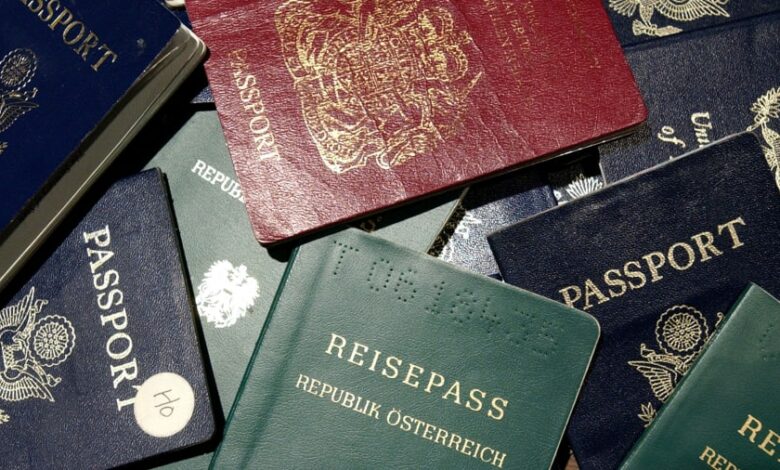
(CNN) — If there was an Olympics of passports, Japan wouldn’t just be hosting it — it’d be winning the whole competition.
The Henley Passport Index, which has been regularly monitoring the world’s most travel-friendly passports since 2006, has released its latest rankings and analysis.
As the index doesn’t take temporary restrictions into account, Japan is once again top of the leaderboard, with its passport offering visa-free or visa-on-arrival access to 193 destinations around the world.
However, the Henley & Partners report says, in the first quarter of 2021 international mobility was still only 12 percent of its pre-pandemic levels, meaning “the gulf between theoretical and actual travel access offered by even high-ranking passports remains significant.”
In the real world, holders of Japanese passports theoretically have access right now to fewer than 80 destinations — about the same as the index ranking of Saudi Arabia, which sits down in 71st place (while Saudis currently have actual travel access to just 58 destinations).
The passport top 10 remains virtually unchanged as we enter the second half of the year, with Singapore remaining in second place (with a score of 192) and South Korea tying with Germany in third place (with a score of 191).
Again, in real-world terms, it’s a little different. Holders of Singaporean passports can right now access fewer than 75 destinations (equivalent to the index ranking of Kazakhstan, which is down in 74th place).
China and UAE biggest climbers
Even countries with highly successful Covid-19 vaccine rollouts are still bound by travel restrictions. The US and the UK are in joint seventh place on the index, alongside Switzerland, Belgium and New Zealand — having both steadily declined in passport power since holding the top spot together in 2014.
In theory, US and UK passport holders are able to access 187 destinations around the world, but the reality is that doors are only open to UK travelers in fewer than 60 destinations, while the US is just ahead at 61. That puts them on a par with Uzebkistan and Rwanda’s index rankings respectively.
As usual, most of the remaining top 10 spots on the index are held by EU countries. Finland, Italy, Luxembourg, Spain are in fourth place; Austria, Denmark are at number five; while France, Ireland, Netherlands, Portugal and Sweden are together at number six. In terms of travel freedom, the big success stories of the past decade have been China and the United Arab Emirates.
Since 2011, China has climbed 22 places — from 90th position to 68th — while the UAE has gone all the way from No. 65 to No. 15. Its work on strengthening diplomatic ties around the world now means that its citizens are allowed easy access to 174 destinations, compared to the 67 destinations of a decade ago.
Passport inequality
Christian H. Kaelin, chair of Henley & Partners, says that while we don’t know how long travel restrictions will continue, it’s clear that global mobility will be severely hampered for at least the rest of this year. “In many countries, serious doubts have arisen as to the ability to handle a global crisis, with the subsequent embrace of more inward-looking priorities.”
He adds, “Increasing isolationism and deglobalization will no doubt have profound consequences, among them further damage to the world’s economy (and) a significant reduction in global mobility.”
Henley has commissioned exclusive research and analysis, finding that international leisure travel remains less than 10 percent of pre-Covid levels and is largely regional.
There is also rising passport inequality in this new era.
Japanese passport holders have visa-free or visa-on-arrival access to 167 more destinations than citizens of Afghanistan, who are at the bottom of the ranking as they can only visit 26 places without needing a visa in advance.
That’s the biggest gap between countries since the index began, says Henley & Partners.
The decade ahead
“Widespread adoption of Covid passports appears to be an imminent reality for those able to access them,” says Robert Maciejewski, CEO of SIP Medical Family Office in Switzerland, in Henley’s report.
“Even if a legal obligation to obtain a Covid passport is unlikely in most democratic countries, not having one will probably result in de facto restrictions of your freedom, whether it comes to travel or to daily routine activities.”
Due to the global disparities in terms of vaccine access and rollout programs,”Covid passports will no doubt further widen passport inequality worldwide,” says Henley’s Kaelin.
IATA, the global trade association for airlines, welcomes the move by many countries to let vaccinated travelers skip quarantine, but also warns that the freedom to travel is something that should be available to all.
Willie Walsh, IATA’s director general, says, “Data shows us that vaccinated travelers should not be restricted. And screening can safely open borders for those without access to vaccination.”
The Henley report also comments on the protectionist approach taken by many governments in response to the pandemic, and the adoption of inward-looking policies. It suggests that if more countries took a collaborative approach, it would have have more beneficial effects globally.
Greg Lindsay, director of applied research at Canada-based non-profit NewCities, says: “As global cities and nations alike grapple with the ramifications of Covid-19, it’s critical they realize the true nature of the threat — and opportunity — before them.
Rather than dwelling on wealthy former residents now working from their second or third homes, they must focus on restoring the flow of immigrants. The cities that make themselves most hospitable to new arrivals in the wake of the pandemic are poised to be the capitals of the new Roaring Twenties.”
The best passports to hold in 2021 are:
1. Japan (193 destinations)
2. Singapore (192)
3. Germany, South Korea (191)
4. Finland, Italy, Luxembourg, Spain (190)
5. Austria, Denmark (189)
6. France, Ireland, Netherlands, Portugal, Sweden (188)
7. Belgium, New Zealand, Switzerland, United Kingdom, United States (187)
8. Czech Republic, Greece, Malta, Norway (186)
9. Australia, Canada (185)
10. Hungary (184)
The worst passports to hold
Several countries around the world have visa-free or visa-on-arrival access to fewer than 40 countries. These include:
108. North Korea (39 destinations)
109. Nepal (38)
110. Palestinian territories (37)
111. Somalia (34)
112. Yemen (33)
113. Pakistan (32)
114. Syria (29)
115. Iraq (28)
116. Afghanistan (26)
Other indexes
Henley & Partner’s list is one of several indexes created by financial firms to rank global passports according to the access they provide to their citizens.
The Henley Passport Index is based on data provided by the International Air Transport Authority (IATA) and covers 199 passports and 227 travel destinations. It is updated in real time throughout the year, as and when visa policy changes come into effect.
Arton Capital’s Passport Index takes into consideration the passports of 193 United Nations member countries and six territories — ROC Taiwan, Macau (SAR China), Hong Kong (SAR China), Kosovo, Palestinian Territory and the Vatican. Territories annexed to other countries are excluded.
Its mid-2021 index has New Zealand in the top spot, with a visa-free/visa-on-arrival score of 136.




